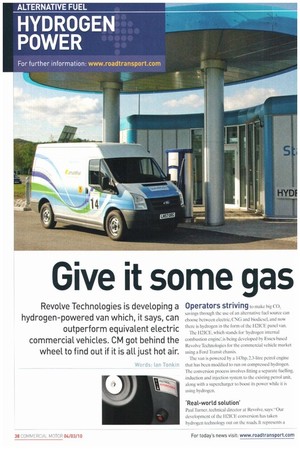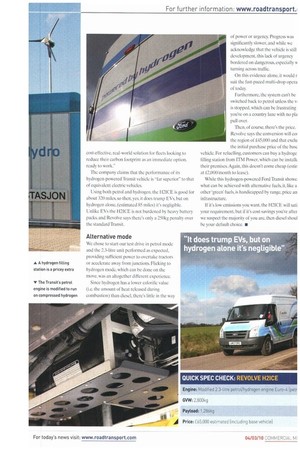Give it some gas
Page 38

Page 39

If you've noticed an error in this article please click here to report it so we can fix it.
Revolve Technologies is developing a hydrogen-powered van which, it says, can outperform equivalent electric commercial vehicles. CM got behind the wheel to find out if it is all just hot air.
Words: Ian Tonkin
Operators striving to make big CO, savings through the use of an alternative fuel source can choose between electric. CNG and biodiesel, and now there is hydrogen in the form of the H2ICE panel van.
The H2ICE. which stands forhydrogen internal combustion engine: is being developed by Essex-based Revolve Technologies for the commercial vehicle market using a Ford Transit chassis.
The van is powered by a 143hp.2.3-litre petrol engine that has been modified to run on compressed hydrogen. The conversion process involves fitting a separate fuelling, induction and injection system to the existing petrol unit. along with a supercharger to boost its power while it is using hydrogen.
'Real-world solution'
Paul Turner, technical director at Revolve.says:"Our development of the I-1210E conversion has taken hydrogen technology out on the roads. It represents a
cost-effective, real-world solution for fleets looking to reduce their carbon footprint as an immediate option. ready to work."
The company claims that the performance of its hydrogen-powered Transit vehicle is "far superior" to that of equivalent electric vehicles.
Using both petrol and hydrogen, the H2ICE is good for about 320 miles, so then, yes, it does trump EVs. but on hydrogen alone, (estimated 85 miles) it's negligible. Unlike EVs the H2ICE is not burdened by heavy battery packs. and Revolve says there's only a 250kg penalty over the standard Transit.
Alternative mode
We chose to start our test drive in petrol mode and the 2.3-litre unit performed as expected, providing sufficient power to overtake tractors or accelerate away from junctions. Flicking to hydrogen mode. which can be done on the move, was an altogether different experience.
Since hydrogen has a lower calorific value (i.e. the amount of heat released during combustion) than diesel, there's little in the way of power or urgency. Progress was significantly slower, and while we acknowledge that the vehicle is still development, this lack of urgency bordered on dangerous, especially vi turning across traffic.
On this evidence alone, it would r suit the fast-paced multi-drop opera of today.
Furthermore, the system can't be switched back to petrol unless the vl is stopped, which can be frustrating you're on a country lane with no pla pull over.
Then, of course, there's the price. Revolve says the conversion will coo. the region of £45.000 and that exclu the initial purchase price of the has vehicle. For refuelling, customers can buy a hydroge filling station from ITM Power, which can be install( their premises. Again, this doesn't come cheap (estin at £2,000/month to lease).
While this hydrogen-powered Ford Transit showe what can be achieved with alternative fuels, it, like a other 'green' fuels, is handicapped by range, price an infrastructure.
If it's low emissions you want, the H2ICE will sati your requirement, but if it's cost-savings you're after we suspect the majority of you are, then diesel shoul be your default choice. •
































































































































